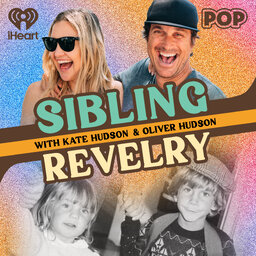For 22-year-old bestselling author, Carrie Berk, it hasn't always been 'Peace, Love, and Cupcakes!"
Despite Carrie's MAJOR success writing children's books, she has quietly 'carried' the burden of anxiety...UNTIL NOW!
Plus, if you think YOU'VE suffered an inconvenient panic attack- wait until you hear how Oliver braved one in the bedroom!
In 1 playlist(s)
Sibling Revelry with Kate Hudson and Oliver Hudson
Sibling Revelry explores the sibling bond, family dynamics, the human mind, and so much more. Kate a…Social links
Follow podcast
Recent clips

It's the Best of Sibling Revelry! (part 1)
32:05

Sex Magic with Dr. Laura Berman
56:11

What's Your Dog Trying to Tell You?
49:42
 Sibling Revelry with Kate Hudson and Oliver Hudson
Sibling Revelry with Kate Hudson and Oliver Hudson